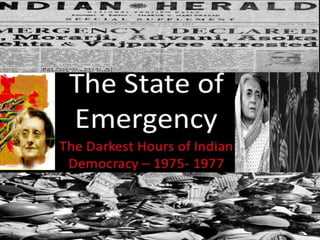
02-Jul-2024 , Updated on 7/4/2024 3:21:34 AM
Emergency of India in 1975: 50 years passed
India faced a rough period in 1975, when Prime Minister Indira Gandhi declared a state of emergency. This decision suspended fundamental rights, imprisoned opposition leaders, and silenced criticism in the name of "peace and stability."
Background: What led to the emergency?
It all began with contentious actions like nationalizing banks in 1969, which enraged many business owners and investors. This action sparked a dispute between the government and the courts. The courts challenged the legitimacy of these actions, sparking a power struggle between the government and the judiciary.
The Trigger: Allahabad High Court Verdict:
The turning moment came in 1975, when the Allahabad High Court declared Indira Gandhi's election illegal because of fraud. This failure, combined with rising opposition marches, gave the administration a reason to invoke constitutional emergency powers. They said that it was required to handle an "internal disturbance."
Dark Days of the Emergency:
The Emergency in India was one of the worst periods in our history. During this period, the government restricted basic liberties, censored the media, and jailed several political opponents. People were compelled to be sterilized, and anyone who spoke out against the regime faced heavy punishment.
But it wasn't just about losing freedoms. People were also not getting the medical care and basic necessities they needed. Many people died because they couldn't get proper healthcare or essential supplies. The government's focus on keeping control meant neglecting the very people they were supposed to take care of, causing a lot of suffering and loss.
This time reminds us how quickly our rights can disappear when power is abused. The stories from those who lived through it show the strength of the human spirit and the constant fight for freedom and justice.
Legacy and What We Learned:
Looking back, the crisis taught us valuable lessons about the perils of delegating too much authority to the government without sufficient checks and balances. It demonstrated the significance of an independent court, a free press, and active citizen participation in preserving democracy. The public's robust reaction, along with international pressure, forced a return to democratic rule.
Moving Forward:
As we reflect on what happened in 1975, it is critical to remember that democracy is fragile and requires continual defense. We must maintain concepts such as fairness, openness, and accountability in our governance. The emergency phase serves as a reminder to citizens and officials alike to preserve democratic values in order to ensure they are never undermined again.
The 1975 emergency was a testing period for India's democracy, demonstrating the dangers of authoritarian control. It serves as a reminder to love and safeguard our democratic liberties in order to prevent history from repeating itself.

Student
I am a content writter !
Comments
Join Our Newsletter
Subscribe to our newsletter to receive emails about new views posts, releases and updates.
Copyright 2010 - 2026 MindStick Software Pvt. Ltd. All Rights Reserved Privacy Policy | Terms & Conditions | Cookie Policy